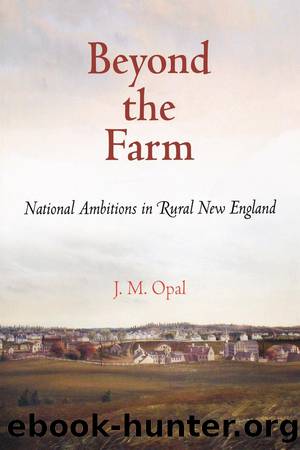Beyond the Farm by Opal J. M.;

Author:Opal, J. M.;
Language: eng
Format: epub
Publisher: University of Pennsylvania Press
Suitors and Strangers
Just as he turned twenty-one in 1814, Edward Hitchcock lost his health. A severe case of the mumps nearly killed him, and a secondary immune response almost blinded him. The aspiring scholar could no longer read without feeling intense pain in his eyes, which meant that he could not prepare for Harvardâs entry exams. No college, no professional future. The sequential disaster turned his âhigh hopes for distinctionâ to idle fancy, and he fell into a paralyzing anxiety about what would become of his life. His friends from the academy and the Adelphi were moving away or marrying, and the upcoming wedding of one such peer reduced him to mournful poetry. Laid up at his parentsâ homeââdown the old laneââhe asked if his friend could spare âone sigh of pure pityâ for him before leaving, âwith her by your side, Your will be fair bride.â The failure of his health and plans underlined his modest origins, which his mentor, Epaphras Hoyt, inadvertently captured in an 1815 recommendation letter. Edward was âa pretty good astronomer for the Countryâ Epaphras noted. Yet Hoyt identified the young man not as his student, his nephew, or as a playwright and orator from the Adelphi and academy, but simply as âa son of Deacon Hitchcock of this Town.â34
While doing odd jobs around town, Edward had little choice but to reconsider the honest living of his father and older brothers. (One of them had left town for a time and then returned; he would later confide to Edward that he had not enjoyed âthe feelings of a stranger in a strange placeâ) The unpretending quality of the family businessâits basis in productivity rather than reputation, autonomous labors rather than approving looksâcarried a well-established claim to manly virtue in rural New England. It also mirrored and reinforced the demanding nature of the family faith. Now that pride had led Edward to ambition, and ambition to disappointment, Calvinism began to make more sense to him. Perhaps he was a sinner, just as his father had always said everyone was. Perhaps Unitarianism was but an âopiate to the conscience,â a device by which the prideful forgot their depravity. The death of another close friend in 1815 deepened Edwardâs spiritual and personal crisis.35
He shared his traumatic passage with Orra White, a preceptress at the academy whom he had earlier cast in The Emancipation of Europe. (She had played the Empress of France, opposite Edward, the noble Emperor of Russia.) The daughter of a wealthy farmer from nearby Amherst, Orra had studied at two academies, including one near Boston. Even her early writings reveal her polish and erudition, her brilliance and creativity. She was also pious. Edward recalls her as the âChristian friendâ with whom he shared his feelings of guilt and experience of rebirth. In contrast to the occasionally hedonistic Silas Felton, Edward never wrote (that is, never preserved) an irreverent word about women, least of all about Orra White. She was his soulmate. She had saved him from himself.
Download
This site does not store any files on its server. We only index and link to content provided by other sites. Please contact the content providers to delete copyright contents if any and email us, we'll remove relevant links or contents immediately.
Cecilia; Or, Memoirs of an Heiress — Volume 1 by Fanny Burney(32075)
Cecilia; Or, Memoirs of an Heiress — Volume 3 by Fanny Burney(31469)
Cecilia; Or, Memoirs of an Heiress — Volume 2 by Fanny Burney(31419)
The Great Music City by Andrea Baker(30797)
We're Going to Need More Wine by Gabrielle Union(18643)
All the Missing Girls by Megan Miranda(14789)
Pimp by Iceberg Slim(13800)
Bombshells: Glamour Girls of a Lifetime by Sullivan Steve(13700)
Fifty Shades Freed by E L James(12926)
Talking to Strangers by Malcolm Gladwell(12889)
Norse Mythology by Gaiman Neil(12861)
For the Love of Europe by Rick Steves(11558)
Crazy Rich Asians by Kevin Kwan(8898)
Mindhunter: Inside the FBI's Elite Serial Crime Unit by John E. Douglas & Mark Olshaker(8722)
The Lost Art of Listening by Michael P. Nichols(7170)
Enlightenment Now: The Case for Reason, Science, Humanism, and Progress by Steven Pinker(6879)
The Four Agreements by Don Miguel Ruiz(6326)
Bad Blood by John Carreyrou(6285)
Weapons of Math Destruction by Cathy O'Neil(5848)
